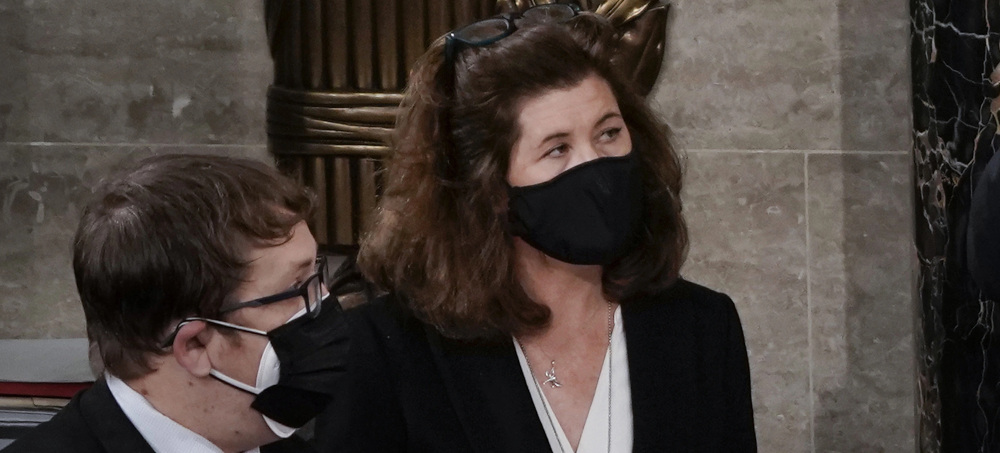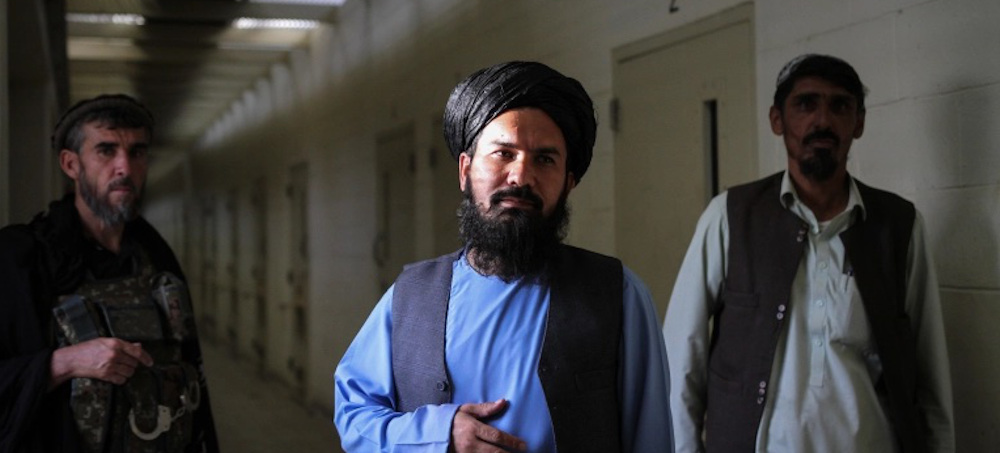Live on the homepage now!
Reader Supported News
ALSO SEE: New Texas Law Signed Friday
Bans Abortion-Inducing Drugs After Seven Weeks Pregnancy
I started my acting career at 15, working in an environment where I was often the only kid in the room. In my late teens, I was accidentally impregnated by a much older man. I was living out of a suitcase in Europe, far from my family, and about to start a job. I struggled to figure out what to do. I wanted to keep the baby, but how?
I telephoned home. My mother was gravely ill in the hospital. My father went to her bedside to discuss my options. We had never spoken about sex before; this was the first time, and it was terrible for all of us. They asked me about the status of my relationship — it was not viable — and warned me how difficult it would be to raise a baby as a teen on my own. My childish fantasy of motherhood was soundly corrected as I weighed answers to their very precise questions. I was just starting out in my career and didn’t have the means to provide a stable home, even for myself. We decided as a family that I couldn’t go through with the pregnancy, and agreed that termination was the right choice. My heart was broken nonetheless.
An older female friend in Germany offered to help me. In her doctor’s office in Cologne, I was given a local anesthetic and had an abortion. I lay awake on the table while the doctor, who was a kind man, explained every step of the process as it happened. It hurt terribly, but I didn’t complain. I had internalized so much shame that I felt I deserved the pain.
My fingers were tightly locked across my chest, and when the procedure was done the doctor looked down at me said, “You have beautiful hands — you remind me of my daughter.” That single gesture of humanity is seared in my mind as one of the most compassionate moments I have ever experienced. In his eyes, I was a person, I was a daughter, I was still a girl.
There is so much pain in this story. It has been my darkest secret until now. I am 51 years old, and I am sharing it with you from the home where I have raised my three children, who are my pride and joy. My life has been extraordinary, at times filled with heartbreak, challenge, loss and fear — just like so many women’s lives — but also marked, like theirs, by courage and compassion. I conceived my beautiful, magical children with men whom I loved and trusted enough to dare to bring a child into this world. I have no regrets for the path I have traveled. I applaud and support women who make a different choice. The abortion I had as a teenager was the hardest decision of my life, one that caused me anguish then and that saddens me even now, but it was the path to the life full of joy and love that I have experienced. Choosing not to keep that early pregnancy allowed me to grow up and become the mother I wanted and needed to be.
I have nothing to gain from this disclosure, and perhaps much to lose. In revealing the hole that this decision carved in me, I hope that some light will shine through, reaching women and girls who might feel a shame that they can’t protect themselves from and have no agency over. I can assure you that no one finds herself on that table on purpose.
The Texas abortion law was allowed to take effect without argument by the Supreme Court, which, due in no small part to its lack of ideological diversity, is a staging ground for a human rights crisis for American women. This law is yet another discriminatory tool against those who are economically disadvantaged, and often, indeed, against their partners. Women and children of wealthy families retain all the choices in the world, and face little risk.
I am grief-stricken, as well, that the law pits citizen against citizen, creating new vigilantes who will prey on these disadvantaged women, denying them the choice not to have children they are not equipped to care for, or extinguishing their hopes for the future family they might choose.
To all of you — to women and girls of Texas, afraid of being traumatized and hounded by predatory bounty hunters; to all women outraged by having our bodies’ rights taken by the state; and to all of you who are made vulnerable and subjected to shame because you have a uterus — I say: I see you. Have courage. You are beautiful. You remind me of my daughters.
 Mark Meadows, Dan Scavino and former campaign manager Brad Parscale are among those being targeted. (photo: Andrew Harnik/AP)
Mark Meadows, Dan Scavino and former campaign manager Brad Parscale are among those being targeted. (photo: Andrew Harnik/AP)
Mark Meadows, Dan Scavino and former campaign manager Brad Parscale are among those being targeted
The subpoenas – which are expected to be authorized as early as this week – would place House select committee investigators inside the White House and Trump campaign war rooms at the time of the insurrection as the panel prepares to ramp up the pace of its inquiry.
House select committee investigators are considering subpoenas for call detail records or testimony of key aides including former White House chief of staff Mark Meadows, deputy chief of staff Dan Scavino and former Trump campaign manager Brad Parscale, the source said.
The scope and subjects of the subpoenas are not yet finalized and discussions about who to include in the first tranche are still ongoing, the source said, although the three Trump officials are presently considered likely targets.
Taken together, the developing move from the select committee marks perhaps the most aggressive investigative actions since the panel made an array of records demands and records preservation requests for Trump officials last month.
It is also likely to further inflame tensions with Trump, already furious at the select committee for opening a line of inquiry into what he knew in advance of plans to stop the certification of Joe Biden’s election win, as well as Republicans under scrutiny over 6 January.
Trump officials such as Meadows, Scavino and Parscale played a major part in advancing baseless and disproven lies about a stolen 2020 election that precipitated the ‘Stop the Steal’ rally which descended into the insurrection as Trump supporters stormed the Capitol.
The former White House chief of staff, who remained by Trump’s side as the violence unfolded, is among several aides who may hold the key to unlock inside information pertaining to the Capitol attack that left five dead and nearly 140 injured.
But House select committee investigators are also taking a special interest in the role played by Scavino, the source said, since he held the additional role of being the director of social media – Trump’s preferred messaging platform.
Subpoenas for call detail records, testimony or other material from those Trump officials and other individuals involved in the 6 January attack would cast a close net around the former president’s inner circle while simultaneously putting them at the center of the probe.
House select committee investigators first signaled their intention to pursue a close inquiry into the potential role played by the Trump White House and House Republicans when they asked 35 telecom and social media companies to preserve records in case of later subpoenas.
In the records preservation requests, the select committee instructed the companies to avoid destroying the records of several hundred people, including House minority leader Kevin McCarthy and, as the Guardian reported, the White House chief of staff Meadows.
Much of the investigative work by the select committee has so far been focused on gathering evidence, as a prosecutor might, to build a case backstopped by empirical data that would safeguard its final report from criticism of partisanship or built-in bias.
To that end, the select committee is also in the process of scheduling closed-door depositions with key persons of interest included in and beyond the subpoenas, the source said, though the agenda and potential subjects of the interviews were not immediately clear.
A spokesperson for the select committee declined to comment about subpoena discussions for Trump administration and campaign officials. But the panel’s chairman, Bennie Thompson, previously told the Guardian he would investigate 6 January conversations involving Trump.
House select committee investigators are showing a new urgency to jolt the investigation into higher gear after the panel held its first hearing before members departed Washington for an extended summer recess. The full select committee – members, counsel and advisors – met for the first time on Monday for more than five hours in the Capitol, taking only short breaks to vote, grab dinner and make an occasional dash to the toilet.
Members and staff for the select committee say they remain in discussions about when and on what topic to schedule a second hearing. At least two members told the Guardian they now expect the next public hearing will be delayed until October, though plans remain fluid.
Congressman Jamie Raskin, a member of the select committee, told reporters after the meeting that new facts about the Capitol attack were surfacing every day and that he expected the panel to ultimately receive all the records and testimony it sought.
Raskin added that he was pushing to secure testimony under oath from anyone with relevant information. “We should see it as an honor and a privilege to be able to provide evidence to Congress about this violent insurrection,” he said.
House select committee investigators are expected to present the subpoenas as non-negotiable, and 6 January select committee member Adam Schiff told reporters that subpoenas were imminent for individuals expected to resist requests for testimony.
“In some cases, we’re making requests we think will be complied with,” said Schiff. “In other cases, we’re going straight to subpoenas where we think we’re dealing with recalcitrant witnesses.”
Schiff, a former Trump impeachment manager from the 2019 trial and the chairman of the House intelligence committee, said he hoped the justice department would also help the select committee hold subpoena defiers in contempt of Congress.
Trump has threatened in recent weeks to mount challenges to the select committee’s work, enraged at the prospect of his embarrassing private efforts to subvert the 2020 election results and reinstall himself in office being made public.
“Executive privilege will be defended, not just on behalf of my administration and the patriots who worked beside me, but on behalf of the office of the president of the United States and the future of our nation,” Trump said in a statement.
It was not clear whether his claims of executive privilege carried weight. The justice department has declined to assert the protection over Capitol attack testimony after the White House office of legal counsel determined it did not exist to benefit private interests.
 Senate Parliamentarian Elizabeth MacDonough, center, works during the certification of Electoral College ballots in the presidential election, in the House chamber at the U.S. Capitol on Jan. 6, 2021. (photo: J. Scott Applewhite/AP)
Senate Parliamentarian Elizabeth MacDonough, center, works during the certification of Electoral College ballots in the presidential election, in the House chamber at the U.S. Capitol on Jan. 6, 2021. (photo: J. Scott Applewhite/AP)
Elizabeth MacDonough’s hubristic approach was on display in her fight against Democrats’ rule change.
By 2013, Senate Democrats faced a long backlog of judicial and executive nominees, with Senate Minority Leader Mitch McConnell thwarting the party’s efforts to confirm the Obama administration’s nominees at every turn. Outside of a few holdouts, Democrats in the Senate were pushing to eliminate the filibuster on judicial and executive appointments below the Supreme Court level. MacDonough played a highly political role in the intense dispute, she recounted.
MacDonough said in her commencement speech that while her nominal job was to assist the elected senators in the body, she felt her true allegiance was to the institution of the Senate, which is cloaked in a heavily contested mythology. “I represent the interests of my unseen client, the institution of the Senate itself. While serving its hundred members on a day-to-day basis, I still represent the Senate,” she said.
“It was the protection of the Senate’s rules and precedents that brought me into conflict with the Senate majority back in 2013 when talk of overturning the Senate’s cloture rule for nominations by what is called ‘the nuclear option’ was revived,” she continued, referring to the parliamentary procedure that lets the Senate override a standing rule by simple majority. “It was my duty to advocate for preservation of that rule and in doing so, I worked with all the gangs.”
The term “gang” is used in the Senate to describe an ad hoc working group of senators, generally from both parties, who’ve formed a group on a temporary basis with a particular goal in mind. A Gang of Six formed to hash out health care reform in 2009, for instance, and a Gang of 10 worked on the recent bipartisan infrastructure plan in the Senate. In 2005, a Gang of 14 got together to fend off changes to filibuster rules when it was Democrats who were holding up George W. Bush nominees.
Offering technical advice to a gang would be well within the scope of her job but, as MacDonough made clear in her address, she allied with the centrists looking to block reform. “We worked on compromise orders; I was warning of nuclear winter, the erosion of the Senate’s trademark comity, and the danger of setting such a precedent,” she said. “I cautioned against the loss of the 60-vote threshold as a bulwark against pressure from the executive branch. I hoped that there would be some understanding that the rules that some in the Senate wanted to amend for a limited advantage were there to protect them from disadvantage in all other circumstances. And for a time, it seemed as though the center would hold.”
MacDonough described the ultimate reform to the filibuster — which allowed the Obama administration to staff its agencies and appoint judges — as a “stinging defeat.” “By November, the argument was lost; the chair on my advice ruled against a point of order on lowering the threshold for cloture, but an appeal was taken, and I was overturned. It was a stinging defeat that I tried not to take personally. That wasn’t easy,” she said.
Of course, she was not overturned because she made no ruling. As parliamentarian, she only advises the chair of the Senate, who is either the vice president or a senator. She reports to the secretary of the Senate, who reports to Senate Majority Leader Chuck Schumer. Her understanding of the event — a majority of senators voting to implement new rules in the chamber where they are elected to serve — as a “stinging defeat” suggests an expansive view of her role in the Senate.
The fight to reform the filibuster has brought the Senate’s real history into relief, with a number of Democratic senators having read the recent book “Kill Switch: The Rise of the Modern Senate and the Crippling of American Democracy,” a history of the filibuster written by Adam Jentleson, a former aide to Senate Majority Leader Harry Reid. The book, along with individual education sessions conducted by Sen. Jeff Merkley, D-Ore., has helped senators understand that the filibuster was not part of the original Senate design, was introduced by accident, expanded in a fluke, and then ruthlessly exploited almost exclusively in defense of segregation and white supremacy.
MacDonough noted that in 2017, when Senate Majority Leader Mitch McConnell, R-Ky., ended the filibuster for Supreme Court justices, she felt a sense of empty vindication. “It will never feel good or rewarding enough to say ‘I told you so’ when people finally understand the point of which you were trying to convince them,” she said.
The notion that McConnell would not have ended the filibuster if Democrats had resisted doing so is at odds with every norm McConnell had been willing to break to keep the seat open, including refusing to entertain a nominee from President Barack Obama.
That year, MacDonough took heat from the right for barring some elements of the Affordable Care Act from being repealed through reconciliation, and from the left for allowing drilling in the Alaska National Wildlife Reserve to go through. But, she said, she had no regrets, and she wasn’t going anywhere. “As a senator said to me recently, if last year didn’t make you retire, you’re never going to go,” she said. That’s just fine with a majority of senators in both parties, Senate insiders said, explaining that MacDonough enjoys an immense amount of popularity on both sides of the aisle and that firing her now would likely blow up any chance of moving anything through reconciliation. Having an unelected bulwark to blame for an inability to govern is a bipartisan thing.
In any event, she did stick around, and in February scotched the Democratic effort to include a minimum wage increase in reconciliation, despite the Congressional Budget Office finding that the policy had a significant deficit impact. MacDonough’s confidence in her position was expressed in the opinion she delivered. After hearing extended arguments from both parties, and sorting through dueling memos, she issued a one-line verdict simply declaring the minimum wage ineligible for reconciliation. The hubris of declining to offer any advice, and instead simply rendering a verdict, infuriated some Democrats involved in the process.
Her opinion, issued Sunday, on including a pathway to legal residency and citizenship in the Democrats’ reconciliation bill suggests that MacDonough took the criticism to heart; this time around, she actually explained her reasoning as to why, she judged, immigration reform shouldn’t be part of reconciliation. But the way she did is indicative of how far removed the position is from that of a staffer offering parliamentary advice. She begins it like a Supreme Court opinion: “The question before us is …”
For a provision to clear what’s known as a “Byrd bath,” there is a six-prong test. Five of those prongs — no need to go into them here — are fairly objective. The sixth, the most subjective, is the “merely incidental” test. A policy can’t be included if its budget impact is “merely incidental.” A staffer offering guidance would let principals know how a policy fared on each prong, and in cases where there’s a gray area, present competing arguments and precedents. Instead, MacDonough waxed poetic about the trials of migrants and then created a brand new precedent that, if taken to its logical conclusion, would bar any significant legislation from moving through reconciliation.
“The reasons that people risk their lives to come to this country — to escape religious and political persecution, famine, war, unspeakable violence and lack of opportunity in their home countries — cannot be measured in federal dollars,” she wrote. That’s a lovely sentiment, but it has nothing to do with interpreting Senate rules. MacDonough should run for office, and in the meantime, the Senate needs staff that can offer unbiased advice.
 Hamza recounts the torture he endured during his imprisonment at Bagram. (photo: Agnieszka Pikulicka-Wilczewska/Al Jazeera)
Hamza recounts the torture he endured during his imprisonment at Bagram. (photo: Agnieszka Pikulicka-Wilczewska/Al Jazeera)
Former prisoners return to the now abandoned US-run Bagram jail, which was notorious for enhanced interrogations.
“They used to tie us to this chair, our hands and feet, and then applied electric shocks. Sometimes they used it for beatings, too,” Hamza says, recounting the torture he underwent during his captivity in Bagram prison between 2017 and the onset of the fall of Kabul last month, when he managed to escape.
The United States set up the Parwan Detention Facility, known as Bagram, or Afghanistan’s Guantanamo, in late 2001 to house armed fighters after the Taliban launched a rebellion following its removal from power in a military invasion.
The facility located within the Bagram airbase in the Parwan province was meant to be temporary. But it turned out otherwise. It housed more than 5,000 prisoners until its doors were forced open, days before the Taliban’s takeover of Afghanistan on August 15.
Sultan, who was jailed at Bagram between 2014 and August 2021, says he lost his teeth during what came to be known as enhanced interrogation techniques that rights groups say amounted to torture and violated international law. The 42 year old, who does not share his surname, opens his mouth to demonstrate the damage.
The Geneva Convention
The group of Taliban members passes a large plaque located at the prison’s wall with the words of the Geneva Convention in English and Dari but nobody cares to read it.
“The following acts are and shall remain prohibited at any time and in any place whatsoever (…). Violence to life and person, in particular murder of all kinds, mutilation, cruel treatment and torture,” it reads.
But they all know that in Bagram, none of these rules applied. As the former prisoners say, if you entered Bagram, there was no way out. And if you were not an enemy fighter before landing there, you would surely leave as one.
None of the thousands of inmates who passed through the site over the 20 years of the American war, received the status of prisoner of war.
In 2002, after the death of two Afghan prisoners in detention, the centre came under scrutiny and seven American soldiers faced charges. The abuses, however, continued and soon became part of the “Bagram handbook”.
Hamza remembers much more than the electric shocks. Hanging upside down for hours. Water and tear gas being poured on sleeping prisoners from the bars on a cell’s ceiling. Confinement in tiny, windowless, solitary cells for weeks or months with either no light or a bright bulb switched on 24/7.
‘Black jail’
According to the former inmates, none of those who experienced solitary confinement, the so-called “black jail”, whose existence the US has denied, left the cells psychologically healthy.
“There were a lot of different forms of torture, including sexual abuse. They used devices to make us less of a man,” Hamza says, without giving details. “It is psychologically hard for me to recall all that was happening. The torture was mostly done by Afghans, sometimes the Americans. But the orders came from the US.”
Hamza joined the Taliban at the age of 16 following the US invasion. In his eyes, the Americans were invaders occupying his land. He saw fighting against them as his duty as a Muslim and Afghan. He would be given training in bomb and IED-making after his classes at the agriculture department at the Kabul University.
He was detained in summer 2017 and first transferred to Safariad prison in Kabul. He then was sent to two other detention facilities before ending up in Bagram four months later. As he says, he was tortured in all the jails he passed through. In the end, he was sentenced to 25 years.
“Eighty-five per cent of people in Bagram were Taliban, the rest were Daesh [ISIL, or ISIS] members. When the American and Afghan forces conducted their operations and couldn’t find any Talibs, they would capture innocent people. Some of them were kept here for years before they were released due to lack of evidence,” Hamza says.
The former prisoners, along with a group of Talibs, walk through the cells in the prison’s barracks and take photos of what remains. Clothing, personal items and tea cups lie scattered on the floor. According to the prisoners, the cells had up to 34 inmates. The walls bear writings in Pashto and Dari.
“People were writing memories, like a diary. We did that because we wanted to leave a testimony in case the Americans kill us. So that people know that we were here,” Hamza says.
“In the beginning, we only had orange clothes but we protested against the colour and then were given white and black, more traditional garments. One piece of clothing per person. We had only one blanket each, even though it was cold in the winter months. Sometimes we had to share them with new prisoners. Some people waited months to get theirs.”
Prison rules
In front of a cell, a large plaque in Dari and English explains the prison rules.
Rule 1: NO THROWING. No throwing or assaulting guards with any object or liquids. You will not throw anything at my guards.
Rule 3: NO SPITTING. You will not spit on my guards or other detainees.
Rule 7: NO DISOBEDIENCE. You will follow all orders of the guard force. There are no exceptions.
But the rules were not always followed.
“I bought a phone from a guard for 1,000 Afghanis ($11.50), we found a hole in the wall and when we had a connection, we made phone calls,” Hamza says. “I had it for two years. It was found a few times, but I always managed to get another one.”
It was the phone that eventually helped the prisoners escape. As the US forces left the base on June 2 without informing the Afghan government and the Taliban intensified its military offensive, Bagram was left with little supervision.
“One of us felt sick and we were calling for help. But no one came. There was only silence,” Hamza says. “This was when we decided to run away. We broke the bars with the metal plates our food was served on.”
After getting out of their cells, the inmates took the weapons left behind by the US Army and captured the few Afghan guards who were still left. They eventually freed them, as well as other inmates.
“More than 5,000 prisoners escaped but I’m not sure how many. The corridors were full of people. I took my phone, found a place to charge it and made a phone call,” says Hamza.
Shortly afterwards, his brother came to pick him up. But the reality outside was unfamiliar.
“When we went out we couldn’t recognise anything, especially the kids. We spent a lot of time with adults only, we hadn’t seen our families. People, cars, everything seemed foreign,” Hamza says.
‘We are not like the Americans’
It is the first time that Hamza has returned to the prison after fleeing. A prison that he never thought he would leave. He walks through the grounds of the former US airbase, where personal items of soldiers and prisoners, food and elements of armour, lie in a disordered mess and he says he is happy that he is now free.
He does not specify what happened to the Daesh fighters who served time along with the Taliban.
About 65 kilometres south at Pul-e-Charkhi prison in Kabul, Mullah Nooruddin Turabi sits on a chair in a prison office. The Taliban leader has been recently appointed as the head of Afghanistan’s prison system, the same function he had under the previous Taliban government in the 1990s. He returned to Afghanistan after 20 years of exile in Pakistan, where many Taliban officials took refugee status following the US invasion.
“Our deeds will show that we are not like the Americans who say that they stand for human rights but committed terrible crimes. There will be no more torture and no more hunger,” Turabi says, as he explains that the new prison staff will include members of the old system and the Taliban mujahideen.
“We have a constitution but we will introduce changes to it and, based on those changes, we will revise the civil and criminal codes and the rules for civilians. There will be much less prisoners because we will follow the rules of Islam, humane rules.”
Turabi does not comment on the killing of four people during the protest in Kabul on September 10, or mounting evidence of the torture against journalists and civilians still being carried out in prisons.
When asked whether the new justice system will mirror the previous Taliban order, he answers with little hesitation.
“People worry about some of our rules, for example cutting hands. But this is public demand. If you cut off a hand of a person, he will not commit the same crime again. People are now corrupt, extorting money from others, taking bribes,” he says.
“We will bring peace and stability. Once we introduce our rules, no one will dare to break them.”
 Sen. Elizabeth Warren, Rep. Cori Bush, Rep. Ayanna Pressley and Rep. Alexandria Ocasio-Cortez introduce legislation that would give the Department of Health and Human Services the power to impose a federal eviction moratorium. (photo: Drew Amngerer/Getty)
Sen. Elizabeth Warren, Rep. Cori Bush, Rep. Ayanna Pressley and Rep. Alexandria Ocasio-Cortez introduce legislation that would give the Department of Health and Human Services the power to impose a federal eviction moratorium. (photo: Drew Amngerer/Getty)
The legislation, led by Rep. Cori Bush of Missouri and Sen. Elizabeth Warren of Massachusetts, would give the Department of Health and Human Services permanent authority to enact an eviction ban during public health crises. When the Supreme Court struck down a moratorium put in place by the Biden administration last month, the majority opinion contended the agency lacked the power to implement it.
Bush and Warren said the ban would not only aid Americans struggling to cover rent because of pandemic-related job losses, but also reduce potential coronavirus exposure by keeping people in their homes. While an uptick in vaccinations has led to more relaxed public health restrictions across the country, the U.S. still reported a seven-day average of about 146,182 cases and 1,448 deaths as of Wednesday, according to the Centers for Disease Control and Prevention.
“We must protect the millions of people who are at risk of losing their homes, their stability and even their lives,” Bush told reporters Tuesday.
The bill may not go far in Congress, even in the House, where a simple Democratic majority can pass legislation. The White House moratorium — which was more vulnerable to legal scrutiny than a law passed by Congress would be — came about last month after congressional leaders decided legislation was unlikely to get to President Joe Biden’s desk.
About 10.7 million renters are behind on their payments, according to the Center on Budget and Policy Priorities.
Several states including New York and California still have eviction bans in place.
Under the proposed bill, nationwide protections from eviction would take effect automatically without an application process. The moratorium would stay in place until 60 days after the end of a declared public health emergency.
The lawmakers said more than three dozen of their colleagues signed on to the legislation. They include Democratic Sens. Ed Markey of Massachusetts and Alex Padilla of California, along with Reps. Alexandria Ocasio-Cortez of New York, Ayanna Pressley of Massachusetts, Ilhan Omar of Minnesota, Mondaire Jones of New York and Jimmy Gomez of California.
Bush helped to bring about the Biden administration eviction moratorium after she slept on the U.S. Capitol steps this summer. The protest came as an earlier ban was set to expire at the end of July.
Congress has approved $46.5 billion in emergency rental assistance in response to the pandemic. Only $5.1 billion in aid had gone out by late last month.
 Community activist India Walton, here in December, is claiming victory over four-term Mayor Byron Brown in the Buffalo, N.Y., race. Brown did not immediately concede. (photo: Lindsay DeDario/Reuters)
Community activist India Walton, here in December, is claiming victory over four-term Mayor Byron Brown in the Buffalo, N.Y., race. Brown did not immediately concede. (photo: Lindsay DeDario/Reuters)
Brown, the endorsed primary candidate, lost the Democratic primary in June to newcomer India Walton. A week later, he used Trumpian red scare rhetoric during his June 28 announcement of his write-in campaign, “there is tremendous fear that has spread across this community. People are fearful about the future of our city… [a]nd they have said to me that they do not want a radical socialist occupying the mayor’s office in Buffalo City Hall.” His write-in campaign has the support of Republicans and wealthy real estate developers.
Brown also tried an end-run around New York election law by submitting petitions on Aug. 17, seeking to be placed on the general election ballot on a new party line, three months after the state’s deadline. Brown had collected approximately 3,000 petition signatures to support a new “Buffalo Party” line for himself on the November ballot. About one-third of the signatures were collected by suburban Republicans, Conservative Party members, and at least one far-right extremist, Gay Thompson.
Erie County Board of Elections rejected the petitions as not timely. Brown appealed to state and federal courts, arguing that the deadline was unconstitutional, despite it having been uncontroversial since the N.Y. Legislature passed a comprehensive set of election calendar changes in 2019.
Brown lucked out by drawing federal judge John J. Sinatra, Jr., a Trump appointee, a former personal attorney of Roger Stone’s with close ties to convicted felon and former congressional representative Chris Collins. Sinatra represented a local pastor connected to Brown in a case involving a pay-to-play RICO suit against Brown and his administration. Sinatra is also the brother of Nick Sinatra, one of Brown’s best real estate developer friends. Nick Sinatra and his companies have donated at least $11,755 to Brown’s campaigns, including $1,000 in June of this year. Brown filmed a PR spot (video) for Nick Sinatra while Sinatra owed over $1M in taxes to the City. The Brown administration dismissed the concerns of the county executive, city council members, and community leaders, “The city is aware of the situation and confident that full payment will be made quickly… Nick Sinatra has been a community-minded developer who has invested heavily in the city.”
On Sept. 3, John Sinatra promptly granted an injunction against the Board of Elections’ rejection of the petition, calling the election calendar framework “unconstitutional” as it applies to independent candidates. The state court followed suit. The Board and Walton appealed the federal decision, while only Walton appealed the state decision. On Sept. 8, the state appeals court issued a stay, and last Wednesday, the federal court granted a stay on Sinatra’s decision, and then Thursday, a few hours after the New York appellate court heard arguments and overturned the state’s lower court decision, the federal appeals court did as well: Brown’s name and new party line will not be on the ballot. The courts decided the day before ballots had to be mailed to military and overseas citizens, Sept. 17.
Buffalo’s elite are coalescing around Brown, a Black man, because they are afraid of Walton’s people-first platform. Walton, a Black woman, describes herself as a democratic socialist and is endorsed by the county Democratic Party, Working Families Party and Democratic Socialists of America.
 Climate change is causing whole forests to die, like this one in New Jersey. The Atlantic White Cedar is particularly vulnerable to changes in the environment like salt water intrusion from storm surges and sea level rise. (photo: New Jersey Parks and Forestry)
Climate change is causing whole forests to die, like this one in New Jersey. The Atlantic White Cedar is particularly vulnerable to changes in the environment like salt water intrusion from storm surges and sea level rise. (photo: New Jersey Parks and Forestry)
New Jersey's Atlantic white cedar forests are turning from green to a pale white, a sign of creeping sea levels and more frequent superstorms.
It’s a term that points to the visceral changes of the landscape — going from lush green to a pale white — and the destruction of the area’s crucial role as a biodome and coastal buffer. These once-thriving forests are a direct result of climate change as the trees are suffocated by saltwater intrusion sparked by sea level rise and an uptick of hurricanes and superstorms.
“If we pay close attention to our environment, we often see that it sends us signals,” LaTourette, the state’s commissioner of environmental protection, said while walking along a ghost forest spanning more than 300 acres in southern New Jersey. “This is a signal about that risk that we all face from saltwater intrusion from storm surge.”
The Atlantic white cedar forests are seen as the first line of defense on New Jersey’s coast. They thrive in freshwater wetlands — swamps so thick that extreme caution and a good pair of wader boots are necessary in order to walk through them. As sea levels rise, these trees are hit first, and the saltwater intrusion is killing them due to their sensitive nature. That water will then move on to inundate farm fields, peoples’ homes, drinking water and businesses.
Along much of the Eastern Seaboard, the once-healthy coastal woodlands are dwindling rapidly — to the extent that if the rate of decline continues, these forested wetlands will reach the “point of no return within the century,” according to University of Virginia and Duke University researchers focused on studying the ecosystems. Ghost forests are already a problem all along the East Coast and in states along the Gulf Coast, such as Louisiana, Mississippi and Alabama.
Coastal woodlands like these are critical ecosystems in the United States, as they filter pollutants, act as natural barriers and store carbon in the ground. But their positioning on the coast puts them at the vanguard of rising sea levels brought on by the warming atmosphere, therefore worsening some of the effects of climate change.
“To be able to look at these forests and see that this is a direct result from climate change is frightening,” says Kristin Meistrell, a Stewardship Project director for the New Jersey Audubon Society, which focuses on environmental awareness and conservation. Meistrell has worked here for nearly 10 years and recalls walks she used to take on the property when she started in 2012, surrounded by live Atlantic white cedar trees. Since then, she’s watched the forests completely die off.
The state and environmental groups are scrambling to restore the cedar species in environments that aren’t as immediately threatened by impending storm surges. Foresters and environmental groups are largely focused on restoring forests in new homes, where they won’t be hit by sea level rise. The groups have cleared out large swaths of land typically filled with other hardwoods like maple, to allow remaining healthy cedars to drop seeds naturally with adequate space and access to sunlight. The New Jersey Audubon Society leverages farmers’ and hunters’ attachment to the land, working with them on their private property to develop forest stewardship plans to manage the property for wildlife like these cedars.
“We’re trying to put this forest type back on the landscape,” State Forester John Sacco said. “When we do that, we’re introducing biodiversity. There are suites of organisms that occur with this forest type that you really don’t find in other forests. It increases biodiversity, helps with resiliency, and it’s part of our natural heritage that we need to keep around and bequeath to the next generation.”
This will take some time. A healthy cedar forest will take decades to develop, and they’re playing catch up after losing more than 80 percent of the woodlands due to logging over the last two centuries.
Growing new trees in safer homes is just one conservation method in their toolbox, as New Jersey and other states also focus on protecting what already exists. The Nature Conservancy works on refuges along the Outer Banks in North Carolina, where it is building oyster reefs and ditch networks to slow down erosion and control water running upstream, and adding more vegetation that can tolerate salt water into the peat soils where the trees typically grow, making root systems more sturdy.
The scientists from University of Virginia and Duke project that coastal forested wetlands will be “drowned and salted out of existence through the North American Coastal Plain within 100 years,” but also note this isn’t the only region globally that’s at risk. Environments in Brazil, Ukraine and Mozambique have similar wetland ecosystems, but don’t currently have research available.
“I think every community, every resident, every business has to ask itself hard questions,” LaTourette said, “about whether it is positioned to confront the ravages of climate change.”
Follow us on facebook and twitter!
PO Box 2043 / Citrus Heights, CA 95611



No comments:
Post a Comment